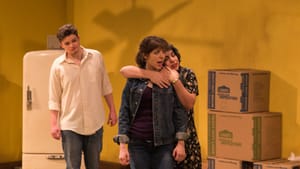Stay in the Loop
BSR publishes on a weekly schedule, with an email newsletter every Wednesday and Thursday morning. There’s no paywall, and subscribing is always free.
Secrets and regrets
A world premiere of 'Empty the House'

Empty the House is an intimate story about family members in trauma, disclosing secrets and regrets.
A mother invites her grown daughter, Faith, to return to Houston after a long absence to help her pack the contents of a home filled with painful memories. Some of those memories are of the abuse she suffered as a child at her mother’s hands. Others are more present: the ghost of her brother, whom the mother rejected because he was gay. The plot is reminiscent of the Broadway musical Next to Normal, with a dysfunctional family and a dead brother who returns as an onstage presence.
The intriguing music was composed by a Curtis student, Rene Orth, and the words were by Pulitzer Prize-winning Mark Campbell, best known for the libretto of Silent Night. The music is soft and beguiling, and, as befitting the small-scale story, the instrumentation is for a chamber orchestra of only ten players, with a string quartet, some one-fingered piano playing, and subtle percussive effects. Arias for each of the three characters are tender, especially when the brother expresses forgiveness. The unresolved parting at the end has some of the flavor of Samuel Barber’s Vanessa (another opera by a composer educated at Curtis).
 But most of the singing was at full volume, which contradicted the intimacy of the relationships. Moreover, the voices seemed to reverberate, almost as if they were amplified. Apparently the microphones worn by the singers were only to record the music for archival purposes, and what we heard was the bouncing of big voices off the walls of the small room. The words and music would make greater impact if delivered sotto voce, as if not meant to be overheard. Performed as it was, the words could only partially be understood. The story was clear only to those of us who had read the libretto beforehand.
But most of the singing was at full volume, which contradicted the intimacy of the relationships. Moreover, the voices seemed to reverberate, almost as if they were amplified. Apparently the microphones worn by the singers were only to record the music for archival purposes, and what we heard was the bouncing of big voices off the walls of the small room. The words and music would make greater impact if delivered sotto voce, as if not meant to be overheard. Performed as it was, the words could only partially be understood. The story was clear only to those of us who had read the libretto beforehand.
Despite the problems with dynamics, conductor Conner Gray Covington seemed in complete command of the complex score. Kendra Broom, who has a warm mezzo voice, was believable as the daughter. Shir Rozzen showed a large dramatic soprano as the mother, successfully encompassing a wide range, but her vocal strength belied the portrait of an aging woman who is unable to continue independent living and her physically vigorous packing of her household goods did not match the idea of an infirm old lady. The libretto specifies that she’s 55 years old, but that seems odd; the character is supposedly feeble, in need of help as she prepares to move into assisted living.
Dennis Chmelensky displayed a nice lyric baritone voice, but was hampered by his foreign articulation. Institutions such as Curtis teach students to correctly sing the language of each opera; so too should foreign students learn to sing unaccented American characters.
What, When, Where
Empty the House, a world premiere opera. Music by Rene Orth; libretto by Mark Campbell. Conner Gray Covington conducted. Ethan Heard directed. January 21-25, 2016 in the Curtis Opera Studio, 1726 Locust Street, Philadelphia. curtis.edu
Sign up for our newsletter
All of the week's new articles, all in one place. Sign up for the free weekly BSR newsletters, and don't miss a conversation.

 Steve Cohen
Steve Cohen